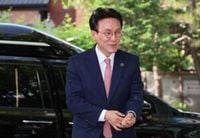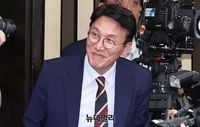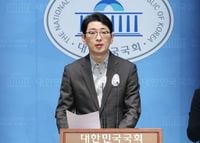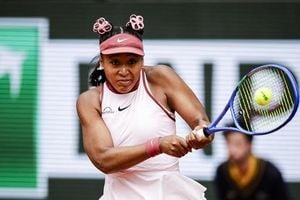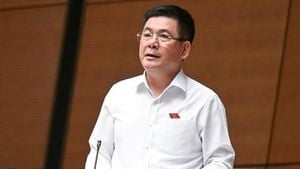As the confirmation hearing for South Korea's Prime Minister nominee Kim Min-seok unfolds, a fierce political battle has erupted, marked by sharp accusations and counterattacks between the ruling Democratic Party of Korea (DPK) and the opposition People Power Party (PPP). The controversy centers on questions about Kim's asset formation, alleged illegal political fund receipts, and the financial dealings of key lawmakers involved in the hearing process.
On June 17, 2025, DPK lawmaker Park Sun-won, a member of the Prime Minister nominee's confirmation hearing special committee, held a press conference at the National Assembly's communication center to challenge PPP lawmaker Joo Jin-woo, who also sits on the committee. Park sharply criticized Joo for repeatedly questioning Kim Min-seok's asset formation and debt issues, accusing him of launching political attacks while portraying himself as morally unblemished.
Park highlighted that according to public official asset declarations as of April 26, 2024, Joo Jin-woo and his family hold assets totaling approximately 7 billion won (around $5.3 million). This figure starkly contrasts with Kim Min-seok's family assets, which total about 200 million won (roughly $150,000). Park questioned how Joo, who has spent nearly 20 years in public service as a prosecutor, could have amassed such wealth on a government salary.
Further intensifying the scrutiny, Park pointed out that Joo's family assets increased by 240 million won in just seven months last year, raising concerns about the transparency of his wealth accumulation. Despite substantial liquid assets—including personal deposits of 550 million won, his spouse's 660 million won, and his eldest son's 780 million won—Joo reportedly carries private debts of 100 million won himself and 180 million won for his wife. Park questioned the legitimacy of these debts, suggesting they might be disguised liabilities, and challenged why repayments have been minimal, especially given the nature of the debts as private loans rather than structured bank loans.
Park also took a pointed jab at Joo's family, noting that his son, born in 2005—the same year as Kim Min-seok's son—already holds deposits worth 740 million won, allegedly from a gift by his grandmother. Park sarcastically questioned whether this grandmother is effectively a 'sponsor,' implying undue influence or favoritism.
Park's criticism extended to the media, accusing it of applying double standards by aggressively pursuing decades-old issues related to Kim Min-seok while largely ignoring similar or greater wealth and financial matters concerning other political figures, such as former Prime Minister Han Duck-soo and acting Prime Minister Choi Sang-mok.
On the opposing side, PPP lawmaker Joo Jin-woo has launched his own barrage of accusations against Kim Min-seok. Joo has demanded that Kim disclose detailed income source documents rather than merely providing gift tax records, arguing that Kim's official income over five years—totaling approximately 510 million won after tax—is insufficient to cover the 620 million won in forfeited funds he paid during that period.
Joo questioned the origins of substantial expenditures attributed to Kim, including hundreds of millions of won for his son's overseas tuition, 230 million won in living expenses, and 200 million won in church donations. He speculated whether these funds might stem from hidden political donations or lucrative lecture fees only accessible to influential politicians. Joo also alleged that most of Kim's forfeited funds were paid by sponsor Kang Shin-seong, suggesting that receiving money from others should naturally incur gift tax obligations.
Adding to the controversy, Joo criticized Kim's borrowing of 140 million won from 11 individuals in 2018, questioning how a person in poor credit could secure such loans and implying that these debts represent obligations to sponsors who might seek to influence government affairs once Kim assumes office.
Kim Min-seok has responded to these allegations by emphasizing the hardship he endured due to what he calls 'targeted investigations' by political prosecutors. He posted on social media that the economic distress from these investigations was unimaginable and that the additional gift tax on forfeited funds amounted to a double penalty. Kim explained that in July 2017, overwhelmed by financial pressure, he decided to borrow 10 million won each from several people simultaneously as the only viable option given his credit status. He asserted these were legitimate debts incurred to manage the tax burden, not illegal political funds.
Kim also addressed past convictions related to illegal political donations. He was convicted in 2004 for receiving 200 million won in illegal funds from SK Group during his campaign for Seoul mayor, receiving an eight-month prison sentence suspended for two years and a 200 million won forfeiture confirmed by the Supreme Court in 2005. Kim claims the forfeiture was due to the non-issuance of receipts for corporate donations requested by the central party without his knowledge, and he paid the amount by using his rental deposit. He maintains that the investigations and penalties have been relentless and that he has paid nearly 1 billion won in forfeiture and gift taxes, only recently clearing private debts through bank loans.
Kim expressed emotional distress over the public scrutiny, especially regarding his family's private matters. He spoke of his wife's tears and the burden on his children's education, lamenting the coldness of being called to hearings and the inclusion of his former wife in the process.
In a social media exchange, Joo dismissed Kim's explanations as a display of privilege consciousness and insisted that illegal funds must be returned to the state. He reiterated his demand for Kim to clarify the sudden increase in assets over the past five years and to provide documentation for income from legal consulting and lecture fees, sarcastically noting that a clear explanation could be made in just five minutes on Facebook.
The scandal has also touched on the so-called 'daddy chance' controversy, involving Kim's son. The younger Kim, while in high school, formed a club that worked on a draft amendment to the Basic Education Act aimed at preventing plagiarism. A similar bill was later introduced in the National Assembly by DPK lawmaker Kang Deuk-gu, with Kim Min-seok as a co-sponsor. Critics allege this was used to boost the son's university admission prospects at Cornell University, where he currently studies.
Kang Deuk-gu defended his actions, stating he was not close to Kim's son and that the bill was based on the general principle that plagiarism is intellectual theft. He emphasized that the idea originated from the club and underwent legislative review before being proposed, arguing that if such a process is considered problematic, many bills in the National Assembly would be similarly questionable.
Meanwhile, Joo Jin-woo has criticized the 'daddy chance' defense as adding fuel to public frustration, questioning how someone with significant debt and no property could afford to send his son to an international high school and then to Cornell University. He demanded transparency regarding tuition payments and rejected dismissing the matter as covered by scholarship.
The confirmation hearing for Kim Min-seok is shaping up to be a contentious affair, with both ruling and opposition parties exchanging heavy accusations and questioning each other's integrity. The debate over asset transparency, political funding, and familial advantages reflects broader issues of political accountability and public trust in South Korea's governance.
As the hearings proceed, all eyes will be on the documents presented, the explanations offered, and the political fallout that may follow. Will Kim Min-seok overcome these challenges and secure his appointment, or will the controversies derail his path? The coming weeks promise intense scrutiny and high-stakes political drama.
